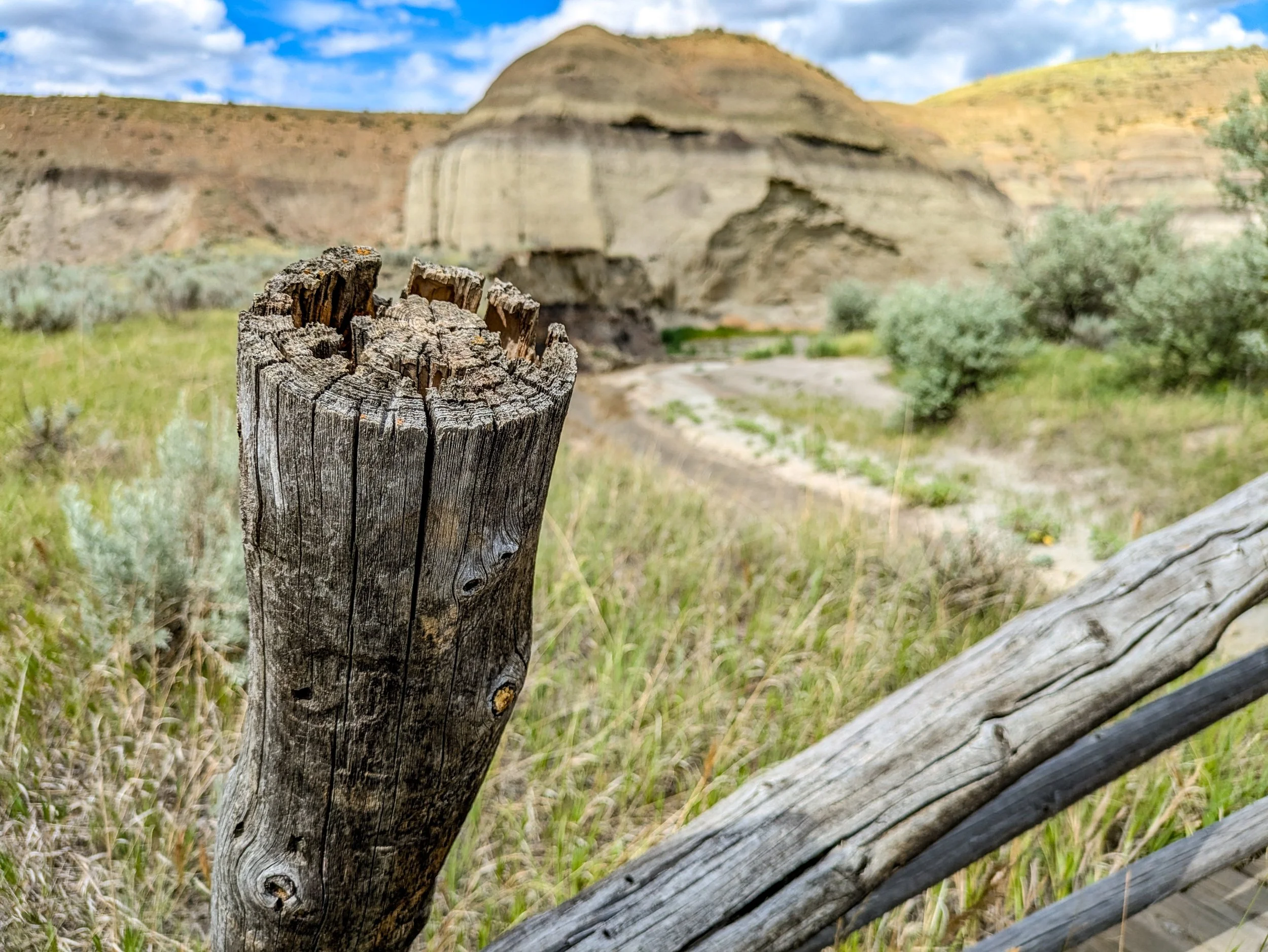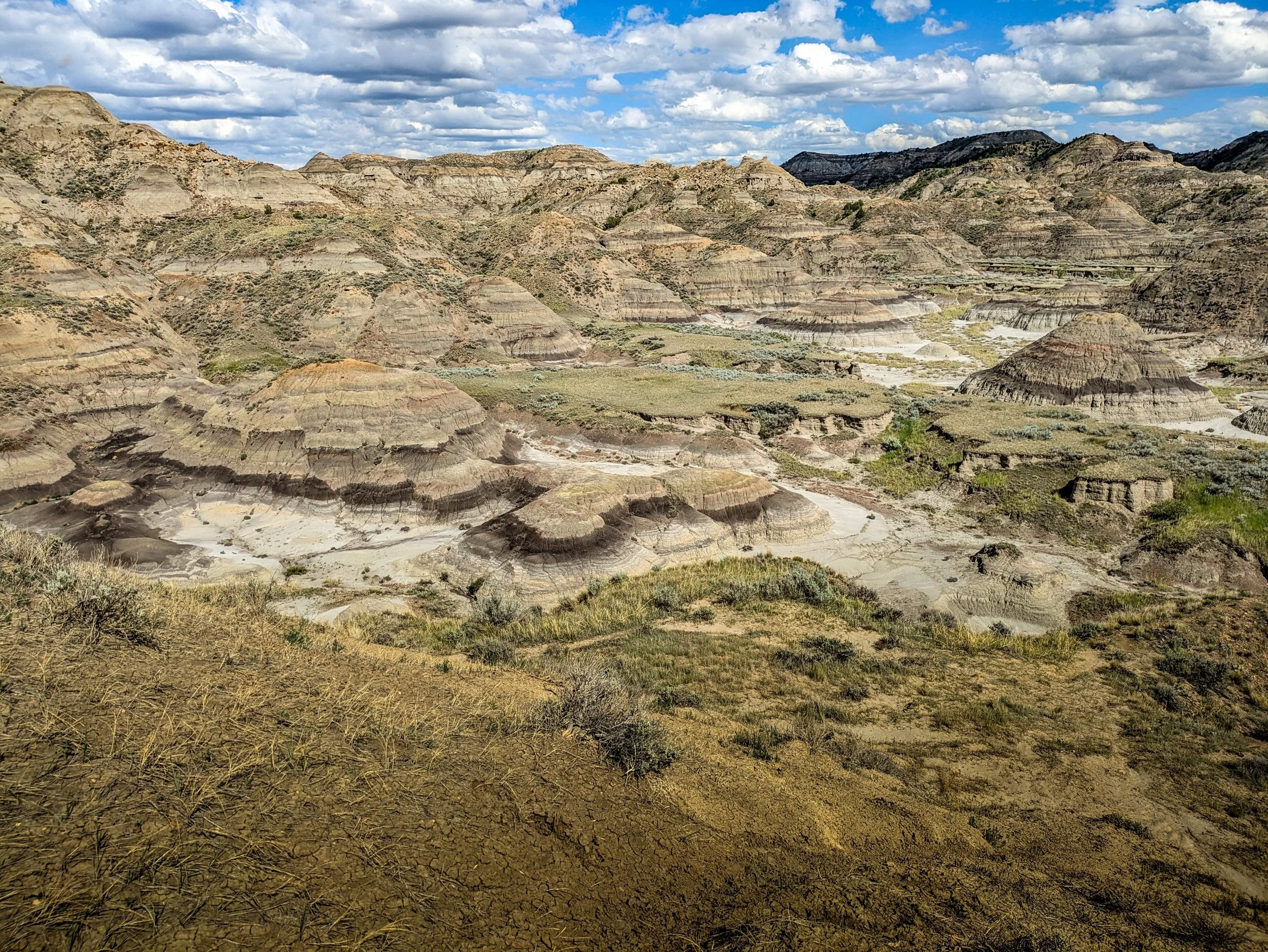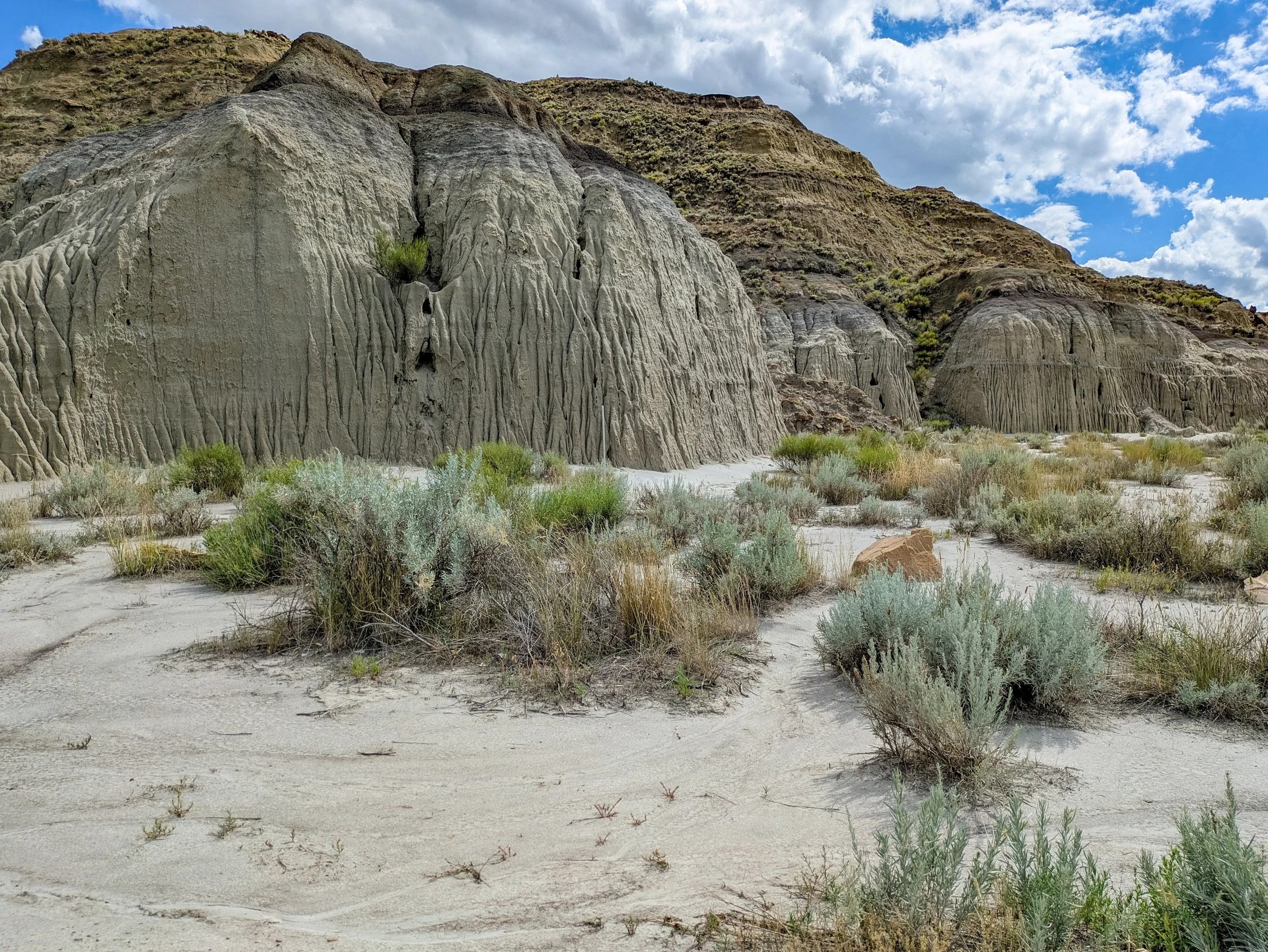Day 21 - the escape from Glendive
Dear reader, please be aware:
What you read next will be an extreme tonal shift to the blog. Why? Partially because it entertains me to do so, partially because most of the things you will read are true.
However, dear reader… beware, lest you also be hectored by the spirits of Glendive.
Dedicated to Robert and Robin Daun, for their love of stories.
The Visitation of Poisoned Mary
A tale told under low lamp-light in the back room of the Society for Reasonable Men Who’ve Seen Unreasonable Things
Gentlemen—permit me a moment before I begin. A bit of warmth to the throat, if you will. You see, I’ve ridden a long road, and though my limbs have mended and my spirits rallied, there’s a part of me that still hasn’t quite returned from eastern Montana.
The place is called Glendive. You may know it, or you may have passed through without incident. If so, count yourself lucky. I was not so fortunate.
I had been on the road for weeks, traveling by bicycle—yes, bicycle, though I assure you it was more beast of burden than toy. My route took me across the upper Midwest, through farmland and plains, riverside towns and quiet crossroads. I was weary when I arrived in North Dakota, and wearier still when I began to hear whispers from other travelers, riders headed east whom I chanced to meet in a saloon in Dickinson. They, looking as weary as me, but eager for news and good conversation.
We sat in that saloon talking of our various adventures across the prairie lands, they from the west, and me from the east. And naturally the conversation lent itself not just to stories, but also of advice about towns and interesting points along the journey. They spoke of Glendive with the sort of fondness one reserves for oases. “Good coffee,” one said. “Clean rooms and soft beds,” added another. “A real place to rest your bones.”
That may have been the case—once.
But before I could take comfort in these endorsements, a man older than the road itself shuffled his way into our conversation from some dark corner and delivered a warning in a voice like bark peeling from an old tree.
“Don’cha go peer’n too longs at Poisoned Mary,” he said, not looking up. “She’ll latch on t’ya, and she won’ts lets go… Not ‘til yer hers… Er yer deads.”
He spoke of her like a legend, but with the certainty of someone who had seen things he’d rather not recall. According to him, she haunted the town—or more precisely, haunted the men who stumbled upon her likeness. She wasn’t a shrieking spirit or a banshee. No, Mary, he said, was cunning in ways far more devious than some simple ghost. She followed her victims not with howls or chains, but with mishaps—small misfortunes that seemed coincidental at first. A flat tire here. A bad turn of weather. Then things escalated: hallucinations, paranoia, an unshakable feeling of being watched. Her weapon was dread, and a feeling of existential peril.
Men affected by her influence would grow restless with anxieties. Townsfolk recalled many who had been seen with darting eyes, looking suspiciously at every mirror, every picture. Occasionally cursing at nothing. And then they just and disappeared.
“Always t’same,” he muttered. “Foun’ drowned in the Yellowstone. Not far downstream oh the bridge. Doc says drown. I thinks not. Not unless the river called them.”
Another local from across the bar confirmed the tale, adding that only one man had survived her haunting, though he eventually went so mad as to be inconsolable. Ended up in an asylum near Missoula, ranting about Mary’s presence at the foot of his bed, night after night, until they finally lobotomized him. He described her as a woman in white, long black hair loose around her shoulders, and eyes black as coal. No irises. No whites. Just… black.
They say she was once Mary Paulson, daughter of a rancher, seduced and discarded by a traveling gentleman who promised her love and left her ruin. The kind of man with a charm that only lasts long enough to bed a foolish girl. Seemingly for Mary her grief—and perhaps shame— were too great to bear so she threw herself into the river, and it was there, or perhaps beneath it, that her spirit changed.
“She’s a spiteful one,” the old man added. “Not just haunting. She hunts.”
At the time, I considered it little more than provincial folklore—charming, if grim. The kind of tale designed to entertain or frighten children. And so, with a skeptic’s heart and a saddle-weary backside, I pressed on.
I arrived in Glendive under a pale sun. The air had the stillness of towns too small for hurry. My hotel—the Riverside Inn—could not accept guests until the afternoon, so I passed the time in the usual way: exploring.
There was a dinosaur museum, a few displays about cowboy life, and a park by the river. All pleasant enough, but lacking spark. It was only when I turned off the main street that I saw the curio shop.
The windows were cluttered with oddities—taxidermied animals with too many limbs, bundles of sage, dreamcatchers browned with age, and what might’ve been a dried monkey’s paw. The sort of place that sells both relics and warnings, though not always separately.
The woman behind the counter was blind—milky-eyed, draped in grey shawls, her skin the texture of withered apples.
“Watch your step,” she said without turning her head, as I stepped into the shop. “Some things in here don’t like to be touched.”
I offered a polite smile, but she gave no indication she noticed me beyond scent or sound. I wandered between shelves and tables, marveling at the inventory. My attention lingered on a silver-framed mirror—tarnished but elegant—and beside it, a jewelry box with ornate etching that looked vaguely Scandinavian.
I lifted the lid.
Inside was a lock of old hair, dark and brittle, tied with a silver thread. Alongside it, a bundle of silver hairpins, each twisted in a shape that suggested utility—or ritual.
Unsettled, I closed it, and that’s when I saw the daguerreotype.
The image was of a young woman—homely, perhaps, but haunting in her presence. She wore a white gown. Her dark hair flowed loose across her shoulders, unbraided and still. Yet, as I stared, I could have sworn I saw it shift slightly, as if caught by a breeze. Her chest... rose. Just once.
And just then a sharp, metallic crash beside me.
I turned and saw the silver mirror—placed securely just moments before—now broken on the floor. Shards glinted like teeth.
The blind woman stood now, screaming at me with sudden, uncanny force.
“I told you to watch your step! GET OUT!”
I tried to apologize, even reached for my wallet, muttering that I would pay for the damage, but she only shrieked louder.
“OUT! OUT!”
And so I fled, dazed and ashamed, into the harsh brightness of the afternoon.
It was then I glanced at my watch.
Two hours had passed. I’d been inside for what had felt more like fifteen minutes.
Back at the hotel, I checked in without incident. The room was modest. Comfortable. The water, however, was foul—rust-colored and sulfuric as is common in some towns. So I let it run until clear, filled my bottle, and made an uneasy peace with the place.
The next morning was Sunday. I had the notion to attend church, perhaps to find some spiritual reassurance. The sign outside said service at eleven. I arrived at 10:50 and watched as a man parked and entered through a side door.
I followed from a distance and went for the same door. It was locked, unmoving.
In fact every door was locked. I knocked at the front. The side. Even the basement entrance.
No answer.
When I circled back to the parking lot, the man’s car was gone.
Puzzled but undeterred, I stopped for coffee at a gas station. The machine scalded me. A syrup dispenser exploded. I tried to laugh it off, but something had begun to coil inside me—a slow-dawning sense that the day itself was conspiring.
Laundry was my next task. The local laundromat accepted only quarters, but the change machine was out. So I went back to the gas station and returned with exactly five dollars’ worth of coinage. But the soap machine devoured a dollar and gave nothing in return. I asked aloud whether the place was cursed.
“Oh, I think about burning it down every time I’m here,” a woman muttered from her folding station. Her companion simply nodded, with a grave sincerity. Neither laughed or even smiled.
They pointed me to another laundromat—across the river.
When I reached my bike, my rear tire was flat.
No nail. No glass. Just a tiny, inexplicable puncture. I patched it in the blazing sun.
By the time I reached the second laundromat, I was soaked with sweat and doubt. I stopped at a grocery and bought a bottle of Afrin to ease my growing congestion. Opened the box in the parking lot and twisted the cap.
Nothing.
Pressed harder.
Still nothing.
Back inside, the clerk offered me a replacement, which she opened without resistance.
I laughed. But not happily.
After washing my clothes, I returned to find my front tire flat. This time the culprit was clear—a a thin silvery bit of metal. Surely just a wire from an exploded truck tire… yet it seemed overly thick.
Back at the hotel, I stepped inside and saw movement in the room’s mirror and started, but quickly assuaged my own fevered brain that it was simply me seeing myself open the door.
I tried the sink again, but the water ran dark, bitter with sulfur yet never cleared. I left the bottle empty and lay down, exhausted.
At four o’clock I awoke—parched, breathless—and felt a strange gravity in the dark room.
There, at the foot of the bed, stood a woman. Her hair hung limp and black across a white gown. Her eyes—bottomless, unblinking—met mine.
I could not speak or even scream. My throat was too dry and my body felt leaden.
I blinked, and she was gone.
With a rapidity that I have never since repeated, I threw my things into my bags and departed. I didn’t check out. I didn’t speak to the desk. I simply mounted my bike, and rode as though fleeing a spreading wildfire.
Half a mile outside Glendive, another flat.
This time I was certain what I pulled from the tire was no wire, but an actual pin! And silver at that!
I fixed the flat bleary with sweat and fingers then pressed on.
Up ahead, roadwork narrowed the highway to a single lane. Twice I was nearly struck by passing cars, as if I was seemingly invisible.
A few miles later, out of the corner of my eye I caught a flash—white and motionless, atop a butte. But when I looked directly, it was only a white wooden cross.
Moments later I was struck by another flat.
Another hasty, panicked repair.
At last, desperate for comfort, I reached for my phone to call my wife.
The screen was black.
Unresponsive. Not a swipe or a press could summon any image.
Yet music still played in my earbuds, piped in from a phone that refused to acknowledge its own life.
And then, in the black glass of the screen, I saw a face peering back at me from beside my own.
A reflection seemingly over my own shoulder.
I spun around to nothing but then I rode.
I rode until my legs burned and my vision blurred. Ten miles. Twenty. More. My hot sweat eventually giving out from the effort.
When at last I reached the next town—Terry—I staggered into the first open bar, phone still lifeless in hand.
And as I crossed the threshold, the screen came to life as if I had surpassed some invisible barrier.
My wife’s name shown on the screen. She was calling me.
I answered with a voice not entirely my own, cracking and raspy, yet full of fear:
“God, am I glad it’s you,” I said. “I’ve had the absolute worst day.”
Now, gents, you may say what you will. A trick of the mind. Heat stroke. Coincidence piled upon coincidence.
But I have one piece of advice.
If you’re ever in Glendive, and you see a silver jewelry box with hair inside, or a daguerreotype of a woman with long black hair and eyes like coal…
Don’t look too long.
And for God’s sake…
Don’t stay.
In all seriousness…
While many of those things actually did happen in Glendive. Four flats, exploding syrup, laundry mishaps, the locked church, the quizzical unopenable afrin, gross water, a seemingly broken phone that wasn’t broken, just super dim…
My stay in Glendive was restive. It allowed me to go visit the local national park Makoshika. Or translated “Bad land”.
I walked around the only trail that wasn’t closed due to fire hazard and took some lovely pictures. I watched three different jurassic park movies (all sucked). I laid in bed and recuperated.
Glendive is fine. I just had some weird crap happen and it’s fun to play at the idea that I or it are cursed.
Leaving today I found myself dispirited especially by what seemed like a broken phone. Mostly because it would prevent me from sharing my experience with you. Also because functionally it really restricts me and makes life less safe.
Walking into the bar and seeing my phone’s screen actually working was such a huge boost to my mood. The other comes from just realizing “You wanted this” — a phrase I often say to myself when the going gets tough, and about 90% of the time it makes me laugh out loud at my own ridiculousness.
Dear reader… I’m fine. Now enjoy some pictures.
Oh, and by the way… Mary Paulson is real, I just found her picture in a museum and used her as inspiration.





